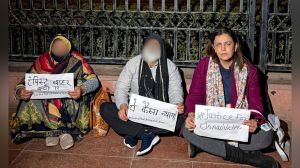Expose the ungodly
Banks were nationalised in 1970 principally to neutralise a section of the Congress which was keen to throw out Indira Gandhi. The fact that...

Banks were nationalised in 1970 principally to neutralise a section of the Congress which was keen to throw out Indira Gandhi. The fact that the money of the fourteen nationalised banks would be used to aid the poor and bring about development proved to be a handy slogan for her. The banker8217;s bank, the Reserve Bank of India, is duty-bound to ensure that all government policies relating to the banking sector are complied with. Guidelines issued in the 1980s require that banks advance 40 per cent of available funds to the weaker sections for specified schemes and only 10 per cent should be given to the medium and large-scale industries. Banks were also required to invest 50 per cent of their funds in government securities.
Since they were nationalised, the banks have suffered a total loss of more than Rs 500,000 crore, if the principal advanced with the interest is included. Banking laws require observance of secrecy about the clients. But all details can be made available for criminal proceedings.Unscrupulous clients in conjunction with obliging bank employees have used this provision to cloak the cheating done in the name of loans.
According to a report, the fourteen largest industrial houses owe banks more than Rs 15,000 crore. In the name of secrecy and revival packages for sick industries, more and more loans are secured. Good money is thrown after bad. As the names of the defaulters are kept secret, they target one bank or financial institution after another. It is surprising but true that industries become sick, but never industrialists. The clever and the crooked manage to milk the industry before declaring it either sick or bankrupt. Never has an industrialist been reduced to penury, unlike his workers, after the demise of the company.
A colleague who heads a state industrial financial corporation told me that the moment he started loan recovery proceedings, there would be a call from either his minister or the chief minister to go slow. The word was always: 8220;Give him one year more torepay.8221;
The little extra time would have cost the Industrialists a few thousand in the form of a donation or a gift. Once an industrialist came to see him in a Mercedes, wearing designer clothes. He wanted two years to repay his loan. My colleague lost his shirt and told him: 8220;If you were really poor, you would be in rags and might have come to see me on foot.8221; The government in the state was a precarious coalition. The industrialist merely cornered two MLAs who were expert horse-traders, and the officer pressing for the recovery of the loan was shifted within 24 hours.
How do we tackle this problem? Is the law adequate, or is legislative change called for? First of all, there should not be any unnecessary shroud of mystery and secrecy about bank dealings. If a client has not been able to honour his commitment even after a grace period, further financial support should be extended only if it was due to circumstances beyond his control. After a definite period, the names of the defaulting parties shouldbe publicly announced. All further financial assistance by all financial institutions and banks should be suspended. If any loan beyond, say, Rs 50 lakh or even a crore is extended to any industry or industrialists, its details should be circulated to other financial institutions. If a particular individual or industry is blacklisted by one financial institution, all others should be apprised, so that they are not taken for a ride. It would be useful to set up a Central Information Bureau, where details of all cheating or defaulting by a person of any financial institution would be available. The details should also cover non-banking finance companies. These details should be comprehensive, whether any police case is registered or not. The details should include the full profiles of the directors of the companies and whether any individual has a stake in more than one company. After closing down and cleaning out one company, some people float similar outfits to repeat the same modus operandi. Informationabout any company or industry which might have defaulted in its repayment to any government or government-aided institutions or even non-banking financial companies, should be freely accessible to any individual. It is essential to have these provisions as millions have lost their savings to private institutions. Stereotyped solutions should be reviewed and mid-course corrections should be implemented.
In the Harshad Mehta scam, estimated to be of the order of Rs 8,200 crore, the cases remain in limbo. Only a dozen witnesses have been examined. The prime accused in the CRB scam, estimated to be of over Rs 1,032 crore, is out on bail and there is no hope of any investor getting anything back. These are serious matters. The accused have obviously no fear of judicial punishment. Jail holds no fears for them, for they have been there before, and have seen what sort of life money can buy even behind bars. The laws need to be simplified and the emphasis should be on compensating individual investors. When suchcheating cases come up, the emphasis is on prosecution.
That certainly needs to be done but at the same time, all property mostly which is benami should not only be attached but liquidated to compensate the victims. It offers no satisfaction to the victim to see the perpetrator in jail. He is interested in getting his money back. No department dealing with law, finance or company affair has paid any attention to this aspect of the problem. Compare the losses suffered by foreign banks operating in India with those of nationalised banks. It is shocking but true that the foreign banks have not suffered any losses, though they operate under the same legal system. The difference is that those who do not safeguard the interests of the foreign banks are shown the door. The level of accountability insisted upon is much higher than what prevails in Indian banks. The government has to levy taxes in every budget to raise resources for development and approach international agencies for loans. Would it not beinfinitely better first to stop leakages and waste? Would it not be in the public interest to insist on the highest accountability in utilising money? Would it not be expedient to sack all those causing losses of hundreds and thousands of crores? It is time that we stopped being a soft state and exercised the option: No results, no job.8217;
The writer is a former director of the CBI
- 01
- 02
- 03
- 04
- 05































